MOVIES
Peru, 2015, 34 min
Martha-Cecilia Dietrich
30.01.2016 17:30
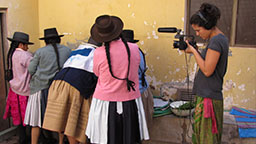 Eudosia is still searching for her husband's remains in the highlands of Ayacucho, Lucero has been in prison for 25 years now for the crime of terrorism against the Peruvian state, and since 2009 the commandos of the counterinsurgency unit Chavin de Huantar recreate and commemorate their heroic military actions to save a nation from the threat of terrorism. Twelve years after the Peruvian Truth and Reconciliation Commission published its final report about the atrocities committed during the internal armed conflict (1980-2000), memories of this period seem more contested than ever. This film explores the complex legacies of twenty years of violence and war in Peru through practices of remembering. In three audio-visual pieces made in collaboration with relatives of the disappeared, insurgents of the Tupac Amaru Revolutionary Movement (MRTA) and members of the Armed Forces, this documentary aims for creating an on-screen dialogue between memories, which in practice remains elusive.
Eudosia is still searching for her husband's remains in the highlands of Ayacucho, Lucero has been in prison for 25 years now for the crime of terrorism against the Peruvian state, and since 2009 the commandos of the counterinsurgency unit Chavin de Huantar recreate and commemorate their heroic military actions to save a nation from the threat of terrorism. Twelve years after the Peruvian Truth and Reconciliation Commission published its final report about the atrocities committed during the internal armed conflict (1980-2000), memories of this period seem more contested than ever. This film explores the complex legacies of twenty years of violence and war in Peru through practices of remembering. In three audio-visual pieces made in collaboration with relatives of the disappeared, insurgents of the Tupac Amaru Revolutionary Movement (MRTA) and members of the Armed Forces, this documentary aims for creating an on-screen dialogue between memories, which in practice remains elusive.
Martha-Cecilia Dietrich recently completed her PhD in Anthropology with Visual Media at the Granada Centre for Visual Anthropology at the University of Manchester and she is currently a post-doctoral scholar at the University of Berne. Her research interests are in the fields of political anthropology, the experience of violence, memory and its diverse articulations.
Language of dialogues: Spanish, Quechua
Language of subtitles: English, Czech
Production: Granada Centre for Visual Anthropology, University of Manchester, UK
Camera: Martha-Cecilia Dietrich, Alexander Houghton
Scriptř: Martha-Cecilia Dietrich
Edit: Martha-Cecilia Dietrich
Festivals (selection):
Ethnocineca, Vienna 2015
Festival do Filme Etnográfico do Recife, 2015
Festival Internationale Jean Rouch,Paris 2015
Itálie, 2015, 30 min
Carlotta Piccinini
29.01.2016 20:05
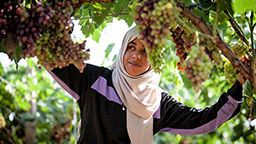 Six women, Zina, Cherifa, Halima, Fatima, Mina and Jamila, who live in the rural areas of Morocco and Tunisia share their dreams and their fight for emancipation through their work. They're connected by a common goal to achieve recognition for their professional identity and gender. They have created farming cooperatives where they combine their ancient knowledge with the development of new products for the local and international markets.
Six women, Zina, Cherifa, Halima, Fatima, Mina and Jamila, who live in the rural areas of Morocco and Tunisia share their dreams and their fight for emancipation through their work. They're connected by a common goal to achieve recognition for their professional identity and gender. They have created farming cooperatives where they combine their ancient knowledge with the development of new products for the local and international markets.
Carlotta Piccinini, born in Bologna on the 9th of August 1979. She's a director and visual artist. Since the beginning of her artistic career, she has been working across different areas, moving from video art and social documentary. That's how she combined her passion for Aesthetics and digital technology with her effort for the defence of human rights. To her, video art and documentary represent an area of constant experimentation, thanks to which she developed new stylistic and narrative codes and found visibility in different festivals, both national and international.
Language of dialogues: Arabic
Language of subtitiles: English, Czech
Production: GVC Onlus and EleNfanT FilM
Camera: Salvo Lucchese
Script: Carlotta Piccinini
Edit: Walter Cavatoi
Festivala (selection):
Human Rights Nights 2015, Italy (Best Short Doc Award)
EtnoFilm Fest 2015, Italy
5° Festival de cine socioambiental de Cipò, Brazil
Malmo Arab Film Festival 2015, Sweden
Mexiko, Slovensko, 2015, 50 min
F. Moran, K. Jamrichová
30.01.2016 19:30
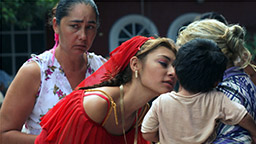 Until the 1990s the Mexican Roma people were living a nomadic life and travelling around Mexico with their travelling movies.
Until the 1990s the Mexican Roma people were living a nomadic life and travelling around Mexico with their travelling movies.
Electricity, television and video records put their business to end. Some of them are still wandering, but the majority of them took an advantage of the favorable land prices in the growing urban agglomerations, built houses and settled down.
Do they feel at home in the houses they had built? They accepted that one can feel at home anywhere while he brings its world over.
The Roma people from Guadalajara have been living settled on the outskirts of the city of Guadalajara – district Zapopan for about 20 years. They form a community of aproximately five to six hundred of persons and usually present themselves as Gypsies or Hungarians. How much have to do with their European relatives? And what do they have in common with their Mexican neighbors ?
The documentary relates the daily life of these Roma community as it occurs in the suburbs of Guadalajara. Have these people managed to maintain their way of life based on the compliance with the traditions of their ancestors and respect for the membership in their lineage. And if yes, how?
Felipe Moran has a Bachelor's Degree in Performing Arts (CECA, TELEVISA, Mexico) and Communication (Univ, Mexico) and Master's Degree in Film Production and Screenwriting (Form and plot, Madrid) and in Documentary Film (ECIB, Barcelona).
He worked as a filmmaker for various television channels – both Mexican and international – among them for example Univision.
Kristína Jamrichová studied Ethnology and Hispanic studies at FFMU, Brno. Currently is PhD student at the Institute of European Ethnology, Brno, working for People in peril organization, Bratislava and studying painting at the Faculty of Fine Arts in Brno. During her Master's studies she spent a year in Mexico, studying and doing her research in local Roma community.
Language of dialogues: Spanish, Romani language
Language of subtitles: Slovak language
Production: Kristína Jamrichová
Camera: Felipe Moran
script: F. Moran, K. Jamrichová
Edit: Sara Pérez Fernández
PREMIERE
USA, 2015, 15 min
Grant Hayes
30.01.2016 20:45
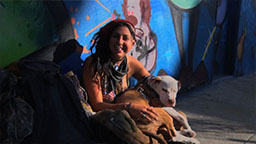 The Haight Ashbury district of San Francisco became a site of historical significance following its central role as the epicenter of the counter-cultural movement in the 1960s. In contemporary times it has transformed into a commercialized tourist attraction that draws on its unique historical context. The Haight Ashbury remains to be a popular congregational place for homeless and transient youth in the United States. The community of youth that gathers here is often at odds with other factions of housed residents and commercial vendors in the district. The Haight's identity is under constant contestation between these commonly opposed groups. The homeless and transient youth population are critiqued in a variety of ways as a result of their lifestyle. Haight Love represents this multifaceted issue and lends an opportunity for the youth themselves to discuss their experiences in order to foster a more compassionate understanding of their lives.
The Haight Ashbury district of San Francisco became a site of historical significance following its central role as the epicenter of the counter-cultural movement in the 1960s. In contemporary times it has transformed into a commercialized tourist attraction that draws on its unique historical context. The Haight Ashbury remains to be a popular congregational place for homeless and transient youth in the United States. The community of youth that gathers here is often at odds with other factions of housed residents and commercial vendors in the district. The Haight's identity is under constant contestation between these commonly opposed groups. The homeless and transient youth population are critiqued in a variety of ways as a result of their lifestyle. Haight Love represents this multifaceted issue and lends an opportunity for the youth themselves to discuss their experiences in order to foster a more compassionate understanding of their lives.
Grant Hayes was born and raised in the state of California in the United States. He is an aspiring Visual Anthropologist currently pursuing his Masters at San Francisco State University in California. Previously he attained his Bachelors degree in Anthropology at San Francisco State University. Grant has a strong inclination toward producing media that mediates between varied antagonistic sets of relationships among groups of people. Grant believes that the value of film in transmitting anthropological critique is its capacity to reach wider audiences and to have greater accessibility. Haight Love is the first and only film he has yet prod uced. Many more are sure to come.
Language of dialogues: English
Language of subtitles: English, Czech
Production, Scipt, Camera, Edit: Grant Hayes
PREMIERE
Česká republika, 2012, 21 min
Barbora Machová
30.01.2016 16:00
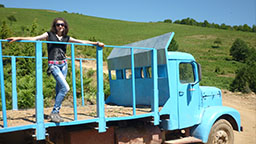 Ivonche, a 15 year old girl, presents everyday life of the place she lives - a small village in the mountains in Macedonia. She speaks about her family, future plans, everyday stereotypes as well as the time of celebration.
Ivonche, a 15 year old girl, presents everyday life of the place she lives - a small village in the mountains in Macedonia. She speaks about her family, future plans, everyday stereotypes as well as the time of celebration.
Barbora Machova has studied European Ethnology and Bulgarian Studies in Brno. She has been doing ethnographic field researches on the Balkans since 2006 focused on contemporary festivities and everyday phenomena. Ivonche is the first film she made.
Language of dialogues: Macedonian
Language of subtitles: Czech
Production: Barbora Machová
Camera: K. Urbánková, G. Fatková, B. Machová
Script: Barbora Machová
Edit: B. Machová, K. Urbánková, G. Fatková,
Festivals (selection):
Etnofilm Čadca 2014
XXII. INTERNATIONAL FESTIVAL OF ETHNOLOGICAL FILM 2013 BELGRADE
II. INTERNATIONAL FESTIVAL OF ETHNOLOGICAL FILM "KRATOVO 2013"
Česká republika, 2015, 30 min
M. Hertlová, T. Hirt
30.01.2016 18:50
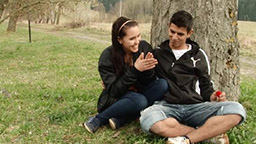
Ethnographic movie „Bouquet“ tells the story of people from roma village Dobra voda about marrige, family and death.
Language of dialogues: Czech
Production: Studio of Visual Ethnography, Department of Anthropology, University of West Bohemia
Camera: M. Hertlová, L. Lupták
Script: E. Gažáková, T. Hirt, M. Hertlová
Edit: M. Hertlová, Š. Špidla
PREMIERE
USA, 2014, 9 min
Emmanuel Vaughan-Lee
29.01.2016 18:25
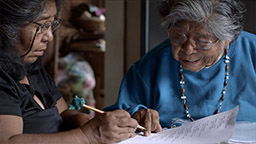 This short documentary tells the story of Marie Wilcox, the last fluent speaker of the Wukchumni language and the dictionary she created in an effort to keep her language alive.
This short documentary tells the story of Marie Wilcox, the last fluent speaker of the Wukchumni language and the dictionary she created in an effort to keep her language alive.
Emmanuel Vaughan-Lee is a filmmaker, musician and composer. His work has been featured on PBS, The New York Times, The New Yorker, National Geographic, The Atlantic, Outside Magazine, exhibited at The Smithsonian and screened in theaters and festivals worldwide. He has directed and produced numerous award-winning films. He lives in a small coastal town in Northern California with his wife and two children.
Language of dialogues: English, Wukchumni language
Language of subtitles: English, Czech
Production: Global Oneness Project
Camera: Vanessa Carr, Adam Loften
Script: Emmanuel Vaughan-Lee
Edit: Adam Loften
Česká republika, 2015, 47 min
Gabriela Fatková
30.01.2016 16:20
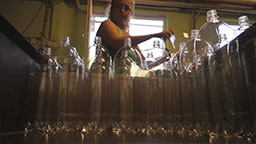 Film focuses on former nomadic shepherds – Bulgarian Sarakatsani and their ways of continual reconstruction of various images of their pastoral past (shepherding, collectivization, persecution in socialist period). Author observes during the 8 year long fielwork 3 families and their ways of dealing with past. Informants tell their shepherd stories while chained in the factory line production of plastic bottles.
Film focuses on former nomadic shepherds – Bulgarian Sarakatsani and their ways of continual reconstruction of various images of their pastoral past (shepherding, collectivization, persecution in socialist period). Author observes during the 8 year long fielwork 3 families and their ways of dealing with past. Informants tell their shepherd stories while chained in the factory line production of plastic bottles.
Gabriela Fatková is a social anthropologist conducting fieldwork in Bulgaria. She focuses on contemporary social organization, migratory strategies and reconstruction of past by former nomadic shepherds. She also teaches courses of Anthropology of religion, Balkan as an anthropological problem and Bulgarian ethnography.
Language of dialogues: Bulharian, Greek
Language of subtitles: Czech
Production: Gabriela Fatková
Camera: Roman Kübelbeck
Script: Gabriela Fatková
Edit: Milan Durňak
Festival:
XXIV. INTERNATIONAL FESTIVAL OF ETHNOLOGICAL FILM 2015 BELGRADE
Etiopie, Velká Británie, Španělsko, 2015, 86 min
Quino Piňero
29.01.2016 20:45
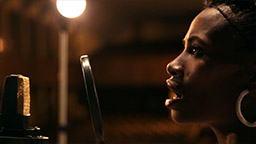 If you go out around music bars and venues in Addis Ababa, you will enjoy a very characteristic scene, but if you want to get an idea of the different sounds from the country, you will get a very narrow view of it; in some places some Amhara or Gurage music may be found but ... what about the rest? There are more than eighty different nationalities and cultures spread all along the mountains, deserts and forests of Ethiopia. Nowadays many of the traditional instruments in Ethiopia have been replaced for electronic keyboards, and many local traditional bands have been reduced to a front(wo)man singing along to a keyboard which plays beats and melodies all in one. But there are still some musicians spread along the country playing the music they learned from their fathers and mothers; intruments like the Krar, Washent, Masinko or Kabero, are nowadays roaring and bouncing against the hills of this land full of contrasts and diversity. In order to unveil the music universe and keep a record of this endangered music tradition, the Roaring Abyss team spent two years performing field recordings around every corner of Ethiopia, documented in this audiovisual poem.
If you go out around music bars and venues in Addis Ababa, you will enjoy a very characteristic scene, but if you want to get an idea of the different sounds from the country, you will get a very narrow view of it; in some places some Amhara or Gurage music may be found but ... what about the rest? There are more than eighty different nationalities and cultures spread all along the mountains, deserts and forests of Ethiopia. Nowadays many of the traditional instruments in Ethiopia have been replaced for electronic keyboards, and many local traditional bands have been reduced to a front(wo)man singing along to a keyboard which plays beats and melodies all in one. But there are still some musicians spread along the country playing the music they learned from their fathers and mothers; intruments like the Krar, Washent, Masinko or Kabero, are nowadays roaring and bouncing against the hills of this land full of contrasts and diversity. In order to unveil the music universe and keep a record of this endangered music tradition, the Roaring Abyss team spent two years performing field recordings around every corner of Ethiopia, documented in this audiovisual poem.
Quino Piñero is a sound engineer and film maker who started his nomadic life at the age of nineteen, always carrying his audio recorder and camera, hence has his work the personal signature of a sound journey, both on music albums and audiovisual pieces. Nowadays Quino Piñero is based in London working as a live sound engineer, while developing new documentary projects through his audiovisual platform SolySombra Recordings.
Language of dialogues: Amharic, Tigrigna, Nuer, Kaffigna, Harari, Oromifa, English
Languege of subtitles: English, Czech
Production: Quino Piñero
Camera: Israel Seoane, Quino Piñero, Gonzalo Guajardo, Jonathan Le Pechon
Script: Quino Piñero
Edit: Guiye Comín, Quino Piñero
Česká republika, 2015, 26 min
Michal Pavlásek
29.01.2016 19:00
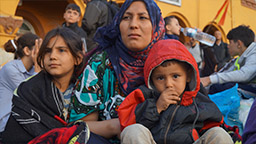 Searching for the exit is a personal documentary insight into one of the most debated topics of today – the forced migration of refugees coming to Europe. The Balkan route is the main migratory gateway into Europe. Having spent several summer weeks among the refugees, the filmmaker had the possibility to build close personal relationships with people coming mostly from Syria, Afghanistan, Iraq, and Pakistan. This recurring pattern of friendship is constantly present in the film thanks to Hussein, a young man from Basra in Iraq who is forced to forget a terrible life tragedy. Hussein’s journey represents a transition between the past and the future, while the filmmaker experiences it as a constant materialization of the uncertainty and dilemmas resulting from his EU citizenship. The passport in his pocket makes him confront his privileged position with the situation of the people he meets during the journey despite the fact that the distance between him and the refugees is often totally erased. The film depicts various encounters and situations from the Balkan route and brings a personal testimony about the border area and state controls, media coverage, volunteer aid, widely spread stereotypes and grey economy. These images and refugee testimonies allow the viewer to experience their journey, get a close up on migration, become a refugee.
Searching for the exit is a personal documentary insight into one of the most debated topics of today – the forced migration of refugees coming to Europe. The Balkan route is the main migratory gateway into Europe. Having spent several summer weeks among the refugees, the filmmaker had the possibility to build close personal relationships with people coming mostly from Syria, Afghanistan, Iraq, and Pakistan. This recurring pattern of friendship is constantly present in the film thanks to Hussein, a young man from Basra in Iraq who is forced to forget a terrible life tragedy. Hussein’s journey represents a transition between the past and the future, while the filmmaker experiences it as a constant materialization of the uncertainty and dilemmas resulting from his EU citizenship. The passport in his pocket makes him confront his privileged position with the situation of the people he meets during the journey despite the fact that the distance between him and the refugees is often totally erased. The film depicts various encounters and situations from the Balkan route and brings a personal testimony about the border area and state controls, media coverage, volunteer aid, widely spread stereotypes and grey economy. These images and refugee testimonies allow the viewer to experience their journey, get a close up on migration, become a refugee.
Michal Pavlásek is researcher in The Institute of Ethnology of the Academy of Sciences of the Czech Republic, v.v.i. Brno. Author is member of Anthropictures - flexible association of social scientists providing independent field research focused on visual and urban anthropology.
production: Czech Television, TPS Petra Kubici.
script, camera, director: Michal Pavlásek
edit: Šárka Sklenářová
assistent of director: Eva Lammelová
Language of dialogues: English, Macedonian, Serbian
Language of subtitles: Czech
PREMIERE
Austrálie, 2015, 25 min
Mandy Hughes
29.01.2016 18:35
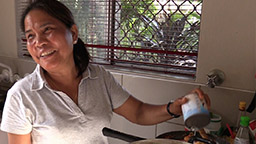 This documentary depicts the food stories of people from Myanmar, now residing in the regional town of Coffs Harbour, Australia. More than 300 people from Myanmar have settled in Coffs Harbour. Some of these settlers have spent more than 20 years in refugee camps. They have fled their homeland with little more than their memories and their stories. But these memories allow their traditions to continue.
This documentary depicts the food stories of people from Myanmar, now residing in the regional town of Coffs Harbour, Australia. More than 300 people from Myanmar have settled in Coffs Harbour. Some of these settlers have spent more than 20 years in refugee camps. They have fled their homeland with little more than their memories and their stories. But these memories allow their traditions to continue.
Mandy Hughes is currently a PhD student of Anthropology at Southern Cross University, Australia. She has experience working in community, international development, education and media and NOG. This is her first independently produced documentary and this project was made in collaboration with the Myanmar community Coffs Harbour.
Language of dialogues: English, Burmese
Language of subtitles: English, Czech
Production, director, camera, edit, script: Mandy Hughes
Festivals (selection):
Viscult Festival of Visual Culture, Finland, 2015
Ethnografilm, France, 2016
Coulourfest, Australia, 2016
Norsko, 2015, 32 min
Léa Klaue
30.01.2016 18:00
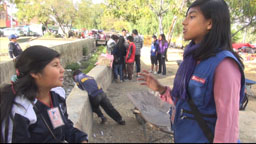 Gerald, Ruben, Neysa and their friends are children and adolescents who work as wheelbarrow pushers at a market and as prayer boys in a cemetery in the region of Cochabamba in Bolivia. With their own labor union – the Bolivian working children's union UNATsBO - they will present their ideas and defend their right to work in front of the parliament, where a new legislature concerning working children is decided. "To work is to grow" presents some working children's opinion about child labour, but also these children's actual work. Work becomes a tool to empower and grow – through one's good as well as one's bad moments.
Gerald, Ruben, Neysa and their friends are children and adolescents who work as wheelbarrow pushers at a market and as prayer boys in a cemetery in the region of Cochabamba in Bolivia. With their own labor union – the Bolivian working children's union UNATsBO - they will present their ideas and defend their right to work in front of the parliament, where a new legislature concerning working children is decided. "To work is to grow" presents some working children's opinion about child labour, but also these children's actual work. Work becomes a tool to empower and grow – through one's good as well as one's bad moments.
Léa was born in 1989 in Bern, grew up in the Swiss Alps where she enjoyed a bilingual education. She completed a Bachelor in Social Anthropology and Media Studies at the Unviversity of Basel and soon knew that she wanted to make films. During this time she travelled many times to Latin America for different reasons, among other to study one semester in Santiago de Chile. Léa completed a Master of Arts in Visual Cultural Studies at the University of Tromsø in Northern Norway with a fieldwork and a film about working children in Bolivia, which is her first film.
Language of dialogues: Spanish
Language of subtitles: English, Czech
Production: University of Tromsø
Camera, script, edit: Léa Klaue
Festivals (selection):
Tromsø, Norway, 2015
Best Graduate Film winner at Society for Visual Anthropology Film Festival, American Anthropological Association Annual Meeting 2015, Denver, USA
Astra Film Festival, 2015, Sibiu, Romania
NAFA Nordic Anthropological Film Association Film festival,2015, Warsaw, Poland
Athens Ethnographic Film Festival, 2015, Athens, Greece
Kratovo Ethnographic Film Festival, 2015, Kratovo, Macedonia
Austrálie, 2014, 55 min
David MacDougall
30.01.2016 21:25
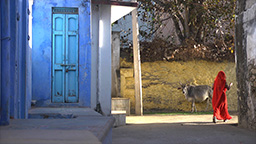 From the 16th century the Indian village of Delwara in southern Rajastan was ruled as a principality of the kingdom of Mewar. Its palace, which overlooks the village, is now a luxury hotel – a world remote from the daily life of villagers. Following off from his film SchoolScapes, which was inspired by the early cinema of Lumiere, David MacDougall here employs a series of precisely observed scenes to explore Delwara´s local primary school as a part of contemporary village life – a life that continues „under the palace wall“.
From the 16th century the Indian village of Delwara in southern Rajastan was ruled as a principality of the kingdom of Mewar. Its palace, which overlooks the village, is now a luxury hotel – a world remote from the daily life of villagers. Following off from his film SchoolScapes, which was inspired by the early cinema of Lumiere, David MacDougall here employs a series of precisely observed scenes to explore Delwara´s local primary school as a part of contemporary village life – a life that continues „under the palace wall“.
David MacDougall is an ethnographic filmmaker and writer on cinema. He has filmed in East Africa (The Jie films and „Turkana Conversation“ trilogy), Australia, and India. In 2005 he filmed at a shelter for homeless children in New Delhi, producing Gandhi´s Children. MacDougall writes regulary on cinema and is the author of Transcultural Cinema and The Corporeal Image: Film, Ethnography , and the Sense. He is presently Adjunct Professor at the Australian National University, where he is directing the project „Childhood and Modernity: Indian Children´s Perspectives“.
Language of dialogues: Merwari
Language of subtitles: English, Czech
Production: Fieldwork Films
Camera, edit: David MacDougall
Festivals (selection):
Margaret Mead Film Festival, New York 2014
Society for Visual Anthropology Film and Media Festival 2014
Jean Rouch Film Festival, Paris, 2014
NAFA film Festival 2014
Royal Anthropological Institute International Ethnographic Film Festival, Bristol 2015
Česká republika, 2015, 0 min
Michal Pavlásek
29.01.2016 18:00
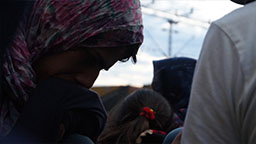
Exhibition of photographs from balkan refugee migration route taken by Michal Pavlásek
„You don´t want to leave it, but you must“
On first day of July we went on Serbian-Macedonian border and Macedonian-Greek border to provide help to the refugees, who were already flowing for a dream to Europe without any publicity about their destiny. During following returns on places situated on balkan migration route the photographs and film material were taking to present these occasions of passed summer.
The exhibition takes place from Friday 29JAN to Saturday 30 JAN in Bio Oko.
 Eudosia is still searching for her husband's remains in the highlands of Ayacucho, Lucero has been in prison for 25 years now for the crime of terrorism against the Peruvian state, and since 2009 the commandos of the counterinsurgency unit Chavin de Huantar recreate and commemorate their heroic military actions to save a nation from the threat of terrorism. Twelve years after the Peruvian Truth and Reconciliation Commission published its final report about the atrocities committed during the internal armed conflict (1980-2000), memories of this period seem more contested than ever. This film explores the complex legacies of twenty years of violence and war in Peru through practices of remembering. In three audio-visual pieces made in collaboration with relatives of the disappeared, insurgents of the Tupac Amaru Revolutionary Movement (MRTA) and members of the Armed Forces, this documentary aims for creating an on-screen dialogue between memories, which in practice remains elusive.
Eudosia is still searching for her husband's remains in the highlands of Ayacucho, Lucero has been in prison for 25 years now for the crime of terrorism against the Peruvian state, and since 2009 the commandos of the counterinsurgency unit Chavin de Huantar recreate and commemorate their heroic military actions to save a nation from the threat of terrorism. Twelve years after the Peruvian Truth and Reconciliation Commission published its final report about the atrocities committed during the internal armed conflict (1980-2000), memories of this period seem more contested than ever. This film explores the complex legacies of twenty years of violence and war in Peru through practices of remembering. In three audio-visual pieces made in collaboration with relatives of the disappeared, insurgents of the Tupac Amaru Revolutionary Movement (MRTA) and members of the Armed Forces, this documentary aims for creating an on-screen dialogue between memories, which in practice remains elusive.
 Six women, Zina, Cherifa, Halima, Fatima, Mina and Jamila, who live in the rural areas of Morocco and Tunisia share their dreams and their fight for emancipation through their work. They're connected by a common goal to achieve recognition for their professional identity and gender. They have created farming cooperatives where they combine their ancient knowledge with the development of new products for the local and international markets.
Six women, Zina, Cherifa, Halima, Fatima, Mina and Jamila, who live in the rural areas of Morocco and Tunisia share their dreams and their fight for emancipation through their work. They're connected by a common goal to achieve recognition for their professional identity and gender. They have created farming cooperatives where they combine their ancient knowledge with the development of new products for the local and international markets.  Until the 1990s the Mexican Roma people were living a nomadic life and travelling around Mexico with their travelling movies.
Until the 1990s the Mexican Roma people were living a nomadic life and travelling around Mexico with their travelling movies.  The Haight Ashbury district of San Francisco became a site of historical significance following its central role as the epicenter of the counter-cultural movement in the 1960s. In contemporary times it has transformed into a commercialized tourist attraction that draws on its unique historical context. The Haight Ashbury remains to be a popular congregational place for homeless and transient youth in the United States. The community of youth that gathers here is often at odds with other factions of housed residents and commercial vendors in the district. The Haight's identity is under constant contestation between these commonly opposed groups. The homeless and transient youth population are critiqued in a variety of ways as a result of their lifestyle. Haight Love represents this multifaceted issue and lends an opportunity for the youth themselves to discuss their experiences in order to foster a more compassionate understanding of their lives.
The Haight Ashbury district of San Francisco became a site of historical significance following its central role as the epicenter of the counter-cultural movement in the 1960s. In contemporary times it has transformed into a commercialized tourist attraction that draws on its unique historical context. The Haight Ashbury remains to be a popular congregational place for homeless and transient youth in the United States. The community of youth that gathers here is often at odds with other factions of housed residents and commercial vendors in the district. The Haight's identity is under constant contestation between these commonly opposed groups. The homeless and transient youth population are critiqued in a variety of ways as a result of their lifestyle. Haight Love represents this multifaceted issue and lends an opportunity for the youth themselves to discuss their experiences in order to foster a more compassionate understanding of their lives. Ivonche, a 15 year old girl, presents everyday life of the place she lives - a small village in the mountains in Macedonia. She speaks about her family, future plans, everyday stereotypes as well as the time of celebration.
Ivonche, a 15 year old girl, presents everyday life of the place she lives - a small village in the mountains in Macedonia. She speaks about her family, future plans, everyday stereotypes as well as the time of celebration.
 This short documentary tells the story of Marie Wilcox, the last fluent speaker of the Wukchumni language and the dictionary she created in an effort to keep her language alive.
This short documentary tells the story of Marie Wilcox, the last fluent speaker of the Wukchumni language and the dictionary she created in an effort to keep her language alive. Film focuses on former nomadic shepherds – Bulgarian Sarakatsani and their ways of continual reconstruction of various images of their pastoral past (shepherding, collectivization, persecution in socialist period). Author observes during the 8 year long fielwork 3 families and their ways of dealing with past. Informants tell their shepherd stories while chained in the factory line production of plastic bottles.
Film focuses on former nomadic shepherds – Bulgarian Sarakatsani and their ways of continual reconstruction of various images of their pastoral past (shepherding, collectivization, persecution in socialist period). Author observes during the 8 year long fielwork 3 families and their ways of dealing with past. Informants tell their shepherd stories while chained in the factory line production of plastic bottles. If you go out around music bars and venues in Addis Ababa, you will enjoy a very characteristic scene, but if you want to get an idea of the different sounds from the country, you will get a very narrow view of it; in some places some Amhara or Gurage music may be found but ... what about the rest? There are more than eighty different nationalities and cultures spread all along the mountains, deserts and forests of Ethiopia. Nowadays many of the traditional instruments in Ethiopia have been replaced for electronic keyboards, and many local traditional bands have been reduced to a front(wo)man singing along to a keyboard which plays beats and melodies all in one. But there are still some musicians spread along the country playing the music they learned from their fathers and mothers; intruments like the Krar, Washent, Masinko or Kabero, are nowadays roaring and bouncing against the hills of this land full of contrasts and diversity. In order to unveil the music universe and keep a record of this endangered music tradition, the Roaring Abyss team spent two years performing field recordings around every corner of Ethiopia, documented in this audiovisual poem.
If you go out around music bars and venues in Addis Ababa, you will enjoy a very characteristic scene, but if you want to get an idea of the different sounds from the country, you will get a very narrow view of it; in some places some Amhara or Gurage music may be found but ... what about the rest? There are more than eighty different nationalities and cultures spread all along the mountains, deserts and forests of Ethiopia. Nowadays many of the traditional instruments in Ethiopia have been replaced for electronic keyboards, and many local traditional bands have been reduced to a front(wo)man singing along to a keyboard which plays beats and melodies all in one. But there are still some musicians spread along the country playing the music they learned from their fathers and mothers; intruments like the Krar, Washent, Masinko or Kabero, are nowadays roaring and bouncing against the hills of this land full of contrasts and diversity. In order to unveil the music universe and keep a record of this endangered music tradition, the Roaring Abyss team spent two years performing field recordings around every corner of Ethiopia, documented in this audiovisual poem. Searching for the exit is a personal documentary insight into one of the most debated topics of today – the forced migration of refugees coming to Europe. The Balkan route is the main migratory gateway into Europe. Having spent several summer weeks among the refugees, the filmmaker had the possibility to build close personal relationships with people coming mostly from Syria, Afghanistan, Iraq, and Pakistan. This recurring pattern of friendship is constantly present in the film thanks to Hussein, a young man from Basra in Iraq who is forced to forget a terrible life tragedy. Hussein’s journey represents a transition between the past and the future, while the filmmaker experiences it as a constant materialization of the uncertainty and dilemmas resulting from his EU citizenship. The passport in his pocket makes him confront his privileged position with the situation of the people he meets during the journey despite the fact that the distance between him and the refugees is often totally erased. The film depicts various encounters and situations from the Balkan route and brings a personal testimony about the border area and state controls, media coverage, volunteer aid, widely spread stereotypes and grey economy. These images and refugee testimonies allow the viewer to experience their journey, get a close up on migration, become a refugee.
Searching for the exit is a personal documentary insight into one of the most debated topics of today – the forced migration of refugees coming to Europe. The Balkan route is the main migratory gateway into Europe. Having spent several summer weeks among the refugees, the filmmaker had the possibility to build close personal relationships with people coming mostly from Syria, Afghanistan, Iraq, and Pakistan. This recurring pattern of friendship is constantly present in the film thanks to Hussein, a young man from Basra in Iraq who is forced to forget a terrible life tragedy. Hussein’s journey represents a transition between the past and the future, while the filmmaker experiences it as a constant materialization of the uncertainty and dilemmas resulting from his EU citizenship. The passport in his pocket makes him confront his privileged position with the situation of the people he meets during the journey despite the fact that the distance between him and the refugees is often totally erased. The film depicts various encounters and situations from the Balkan route and brings a personal testimony about the border area and state controls, media coverage, volunteer aid, widely spread stereotypes and grey economy. These images and refugee testimonies allow the viewer to experience their journey, get a close up on migration, become a refugee. This documentary depicts the food stories of people from Myanmar, now residing in the regional town of Coffs Harbour, Australia. More than 300 people from Myanmar have settled in Coffs Harbour. Some of these settlers have spent more than 20 years in refugee camps. They have fled their homeland with little more than their memories and their stories. But these memories allow their traditions to continue.
This documentary depicts the food stories of people from Myanmar, now residing in the regional town of Coffs Harbour, Australia. More than 300 people from Myanmar have settled in Coffs Harbour. Some of these settlers have spent more than 20 years in refugee camps. They have fled their homeland with little more than their memories and their stories. But these memories allow their traditions to continue. Gerald, Ruben, Neysa and their friends are children and adolescents who work as wheelbarrow pushers at a market and as prayer boys in a cemetery in the region of Cochabamba in Bolivia. With their own labor union – the Bolivian working children's union UNATsBO - they will present their ideas and defend their right to work in front of the parliament, where a new legislature concerning working children is decided. "To work is to grow" presents some working children's opinion about child labour, but also these children's actual work. Work becomes a tool to empower and grow – through one's good as well as one's bad moments.
Gerald, Ruben, Neysa and their friends are children and adolescents who work as wheelbarrow pushers at a market and as prayer boys in a cemetery in the region of Cochabamba in Bolivia. With their own labor union – the Bolivian working children's union UNATsBO - they will present their ideas and defend their right to work in front of the parliament, where a new legislature concerning working children is decided. "To work is to grow" presents some working children's opinion about child labour, but also these children's actual work. Work becomes a tool to empower and grow – through one's good as well as one's bad moments. From the 16th century the Indian village of Delwara in southern Rajastan was ruled as a principality of the kingdom of Mewar. Its palace, which overlooks the village, is now a luxury hotel – a world remote from the daily life of villagers. Following off from his film SchoolScapes, which was inspired by the early cinema of Lumiere, David MacDougall here employs a series of precisely observed scenes to explore Delwara´s local primary school as a part of contemporary village life – a life that continues „under the palace wall“.
From the 16th century the Indian village of Delwara in southern Rajastan was ruled as a principality of the kingdom of Mewar. Its palace, which overlooks the village, is now a luxury hotel – a world remote from the daily life of villagers. Following off from his film SchoolScapes, which was inspired by the early cinema of Lumiere, David MacDougall here employs a series of precisely observed scenes to explore Delwara´s local primary school as a part of contemporary village life – a life that continues „under the palace wall“.